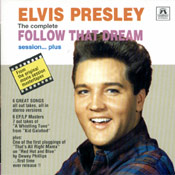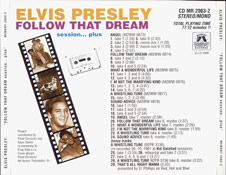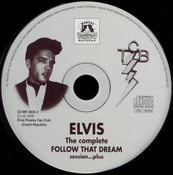| | Track listing: | |
| 01 |
Angel (take 1) |
01:28 |
| 02 |
Angel (take 2) |
02:55 |
| 03 |
Angel (take 4) |
02:49 |
| 04 |
Angel (take 5) |
02:51 |
| 05 |
Angel (take 6) |
02:43 |
| 06 |
Angel (movie mix I) |
01:21 |
| 07 |
Angel (movie mix II) |
01:20 |
| 08 |
Follow That Dream (takes 1, 2) |
02:16 |
| 09 |
Follow That Dream (take 3) |
02:06 |
| 10 |
Follow That Dream (takes 4, 5) |
02:25 |
| 11 |
What A Wonderful Life (takes 1, 2, 3) |
04:05 |
| 12 |
What A Wonderful Life (takes 4, 5, 6) |
04:52 |
| 13 |
I'm Not The Marrying Kind (takes 1, 2, 3,
4) |
03:08 |
| 14 |
I'm Not The Marrying Kind (takes 5, 6, 7) |
04:22 |
| 15 |
A Whistling Tune (takes 1, 2, 3) |
03:49 |
| 16 |
Sound Advice (take 1) |
01:55 |
| 17 |
Sound Advice (takes 2, 3) |
00:54 |
| 18 |
Sound Advice (takes 4, 5) |
02:38 |
| 19 |
Angel (take 7 master) |
02:39 |
| 20 |
Follow That Dream (take 6, master) |
01:38 |
| 21 |
What A Wonderful Life (take 7, master) |
02:26 |
| 22 |
I'm Not The Marrying Kind (take 8, master) |
01:50 |
| 23 |
A Whistling Tune (take 4, master) |
02:14 |
| 24 |
Sound Advice (take 6, master) |
01:49 |
| |
|
|
| |
Bonus Tracks: |
|
| 25 |
A Whistling Tune
(take 1) |
03:33 |
| 26 |
A Whistling Tune
(take 2) |
03:28 |
| 27 |
A Whistling Tune (takes 3, 4, 5, 6, 7) |
03:28 |
| 28 |
A Whistling Tune (take 8, master) |
03:22 |
| 29 |
That's All Right
(WHBQ - Red Hot And Blue, July 1954) |
02:30 |
 |
|
|
| |
| | | |
Tracks 25 - 28
re-recorded 26/10/61 at Kid Galahad sessions
From the liner notes:
This session was recorded an July 2, 1961 at RCA's Studio B in Nashville, where
Elvis had done most of his recording-sessions since June 1958. It's clear that
he's very much at ease during these sessions, although it's apparent that he's
not overly impressed with some of the material. He disliked 'Sound Advice' so
much that he did not even want it to be released. Nevertheless, it was released
four years later when RCA released "Elvis For Everyone", an album that consisted
of left-overs. "A Whistling Tune" was not used for the movie, but Elvis
re-recorded the song an October 26, 1961 for "Kid Galahad". All outtakes of both
versions are included an this release.
The publishing agreement with Hill & Range was already beginning to reflect an
the quality of some of the songs, but the saving grace was Elvis' voice, which
was at its peak in the early sixties. His intensive work an his vocal techniques
during the Army years had really paid off, and his voice was now a beautiful
clear instrument that excelled particularly an the ballads. But let's not forget
the Input of his brilliant studio band, which consisted of some of Nashville's
finest players like Hank Garland, Buddy Harman and Floyd Cramer. Unfortunately,
guitarist Hank Garland was involved in a very serious car-accident shortly after
this session, which made it practically impossible for him to play the guitar.
On the October 1961 session, he was replaced by Jerry Kennedy, who is best known
for playing that memorable riff an Roy Orbison's "Pretty Woman".
The highlights of the July 2, 1961 session are "Follow That Dream" and "What A
Wonderful Life", both sparkling "happy go lucky" rockers, and the beautiful
ballad "Angel", which has become a fan's favorite over the years. The title-song
has stood the test of time well, and it's still being performed in concert by
Bruce Springsteen. Shortly alter the film was released, there was a rumor that
Elvis had also cut the old Al Jolson song "I Want A Girl (Just Like The Girl
That Married Dear Old Dad)"' during these sessions, but there's nothing to
indicate that this is true. It's definitely not on the session-tapes!
As a very special "bonus", we've included an amazing recording: a July 1954
broadcast of Dewey Phillips playing "That's All Right Mama" on his show RED HOT
& BLUE on WHBQ! This recording is being played at Sun Studios in Memphis during
their guided tours, and was obtained from the tourguide, who said that it was
taken from acetate. He doubts that this is actually the first time that Dewey
played Elvis on the air, but it's definitely one of the first times. That makes
this recording, which has never been released before in any form, an amazing
piece of Presleyana and a significant part of music history.
| |


